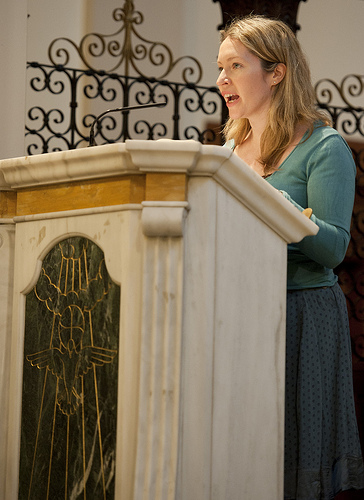Preparing Your Wedding Liturgy
Choosing Music 3: Music for the Liturgy

Preparing your Wedding Liturgy
Whatever the form of the wedding liturgy some parts of it are intended for singing. For example in the Liturgy of the Word the Responsorial Psalm and the Gospel Acclamation should normally be sung. Some of the liturgical texts occur in any of the forms of the wedding liturgy; some are only included when there is the celebration of Mass.
For many couples this may be the hardest music to choose due to a lack of familiarity with the possible choices. Not only that but those who come to the wedding may also be unfamiliar. These, however, are not necessarily reasons for skipping these music choices. Even those who go to Mass often may be pushed to name or remember various settings they might sing every Sunday. There is a reason for this — this is music which is intended for use in the liturgy and does not make sense elsewhere, but this is also music which can lift a celebration. Much of it is written so that it can be easily be picked up and your organist/music director will be able to advise you what is possible.
All Wedding Celebrations
There are 3 points where the liturgical text suggest that it is sung: the responsorial psalm, the Gospel acclamation and the Acclamation after Consent.
Responsorial Psalm
Couples may often choose the psalm text as part of their reflection on the readings — it is an integral part of the Liturgy of the Word. Where that is the case the organist will be able to advise you a suitable setting.
The normal form of the responsorial psalm is a short refrain or response sung by everyone and psalm verse sung by a cantor. In the response people respond to the word they have heard proclaimed but also express something of their hopes for the couple. Musical settings are usually designed so that the response can easily be sung by all.
Some will look to replace the psalm by a hymn, possibly a paraphrase of the psalm text, this does miss the element of dialogueand reflection which the responsorial psalm brings.
Others may decide to have the psalm read — there is a danger then that it is treated as another reading and the poetry is lost.
Alleluia or Gospel Acclamation
This is sung before the proclamation of the Gospel. The Gospel is the highpoint of the Liturgy of the Word. The Alleluia is intended both to greet the Gospel and to prepare people to be ready for it. It may accompany a procession.
If no other liturgical text is sung this should be. There are a number of musical settings of the Alleluia which will be familiar to people — even if think they do not know any. These include the Paschal Alleluia and the Celtic Alleluia.
In Lent the Alleluia is not sung and is replaced by an Acclamation such as ‘Praise to you, O Christ, king of eternal glory.'
Acclamation after Consent
Following the exchange of Consent the minister invites everyone to bless God with the dialogue:
Let us bless the Lord.
Thanks be to God.
The rite suggests that this might be replaced by a sung acclamation. At this moment everyone is invited to thank God for bringing the couple together and blessing them in this marriage. Acclamations are usually short songs of praise with the implication that everyone knows them enough so that they can give attention to what is happening — e.g. people should be looking at the couple rather than a service booklet to check the words. For a congregation familiar with the music of Taizé something like Laudate Dominum would work well. It might also be highly suitable to repeat the Alleluia (which means ‘praise God’) sung at the Gospel
What else? Antiphons, Nuptial Blessing, Our Father
There are other parts of the liturgy which may be sung. The Church provides Antiphons for use at the Entrance (and at Communion) for every Mass including weddings. These are short scriptural phrases often sung with psalm verses. In most parishes these are replaced by hymns but the texts themselves can help give ideas of suitable themes to look for.
Nuptial Blessing. This long blessing of the couple may be said or sung by the minister. A musical setting is provided in the Order of Celebrating Matrimony. To sing this text highlights it and adds to the solemnity of the occasion.
Our Father. Though people can appreciate singing this text, at a Wedding there can be good reasons for saying it together. The Our Father or Lord’s Prayer is the prayer of the baptised and is, therefore, shared across the Christian denominations. For many people in the congregation this could be the one familiar text from their own tradition and therefore it is better if all can pray it together.
Matrimony With Mass
Gloria
When a Wedding is celebrated with Mass there is a Gloria. (There is not a Penitential Act (Lord, have mercy) at any Wedding liturgy.) The Gloria is a text intended to be sung. It can be sung
- all the way through by the whole congregation
- with the congregation singing a response or refrain and the rest of the text sung by cantor or choir
- all the way through by the choir.
For many weddings the second option will be the most practical and familiar practice in many parishes. As with the Responsorial Psalm there are settings where the response is written to both evoke the joy of the words and the occasion and to be easily sung by all present.
Eucharistic Acclamations
At the heart of every Mass is the Eucharistic Prayer where the bread and wine we offer becomes the Body and Blood of Christ. The majority of the Prayer is said by the Priest but there are important parts for the people within it:
- Holy, Holy or Sanctus
- Memorial Acclamations (e.g. We proclaim your Death, O Lord…)
- Amen
These are parts which can be sung by all — indeed, unlike the Gloria, the Church’s documents do not imagine these being sung by a choir alone. There are a wide variety of musical settings some of which are written to be picked up by an unfamiliar congregation. One possibilty is the setting found in the Roman Missal which parishes across the country are familiar with.
In deciding whether to sing the Eucharistic Acclamation or to say them the question of people’s particiation should be considered. It may be better for all to say the texts than a few people to sing them — but, don’t underestimate people’s willingness to participate, ’to have a go’ on a special occasion.
Lamb of God
Before the distribution of Holy Communion is an ancient litany: Lamb of God or Agnus Dei. This can be sung by similar groups as the Gloria, e.g. all, cantor and all, choir.
Further Information
- Lectionary - Psalm & Gospel Acclamation
- Marriage Texts - Antiphons (pdf)
- Nuptial Blessings (pdf
